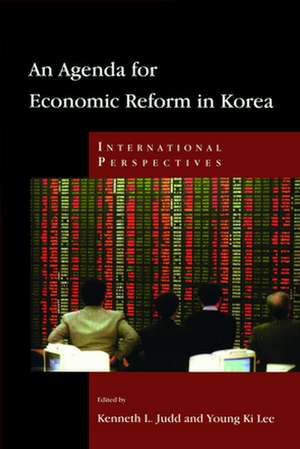An Agenda for Economic Reform in Korea: International Perspectives
Editat de Kenneth L. Judd, Young-Ki Leeen Limba Engleză Paperback – 12 oct 2000
The Korean economy has achieved unprecedented growth over the last three decades. But the state-led development strategy that generated this impressive economic performance has also created major problems that include an undue concentration of economic power, inadequate social services, and strained industrial relations. If Korea is to achieve its goals of an advanced economy and a unified nation, a new vision for the Korean economy is imperative. An Agenda for Economic Reform in Korea looks at Korea's economic problems from the perspective of the American experience with economic reforms—and in doing so sheds new light on the problems of economic reform facing nations all over the world. From this truly international outlook, the authors examine such issues as corporate governance, social welfare, labor relations, and other pressing challenges—and suggest a new vision for the Korean economy in the twenty-first century. The expert contributors reveal why
•The "cozy" relationship between the Korean government, big business, and banks must be broken up if economic reform is to succeed
•Any economic reform that breaks up the typical close relationships among Korean firms may put a new burden on the legal system
•Drastic policies such as breaking up the chaebols—the huge conglomerates that have dominated Korean business—are neither feasible nor desirable
•The cultural and institutional factors that have driven Korea's economic development have also created the problem of so-called pariah capitalism—and why the economy must escape from this trap
•Korea must learn to balance a market economy with effective social safety nets in order to create a mature civil society
•A system of checks and balances to increase the transparency of corporate governance is crucial to resolving inequities in the distribution of wealth in Korea
•Any new model of welfare reform must make use of elements of traditional Korean culture to fully succeed
The economies of Korea and the United States, although different, have faced similar problems. As the world becomes a global marketplace, the differences between these economies will shrink, and each will be better able learn from the experience of the other. An Agenda for Economic Reform in Korea makes a major contribution to that learning process.
•The "cozy" relationship between the Korean government, big business, and banks must be broken up if economic reform is to succeed
•Any economic reform that breaks up the typical close relationships among Korean firms may put a new burden on the legal system
•Drastic policies such as breaking up the chaebols—the huge conglomerates that have dominated Korean business—are neither feasible nor desirable
•The cultural and institutional factors that have driven Korea's economic development have also created the problem of so-called pariah capitalism—and why the economy must escape from this trap
•Korea must learn to balance a market economy with effective social safety nets in order to create a mature civil society
•A system of checks and balances to increase the transparency of corporate governance is crucial to resolving inequities in the distribution of wealth in Korea
•Any new model of welfare reform must make use of elements of traditional Korean culture to fully succeed
The economies of Korea and the United States, although different, have faced similar problems. As the world becomes a global marketplace, the differences between these economies will shrink, and each will be better able learn from the experience of the other. An Agenda for Economic Reform in Korea makes a major contribution to that learning process.
Preț: 185.81 lei
Preț vechi: 220.73 lei
-16% Nou
Puncte Express: 279
Preț estimativ în valută:
35.56€ • 37.08$ • 29.55£
35.56€ • 37.08$ • 29.55£
Carte indisponibilă temporar
Doresc să fiu notificat când acest titlu va fi disponibil:
Se trimite...
Preluare comenzi: 021 569.72.76
Specificații
ISBN-13: 9780817997328
ISBN-10: 0817997326
Pagini: 535
Dimensiuni: 155 x 231 x 33 mm
Greutate: 0.87 kg
Ediția:1st Edition
Editura: Hoover Institution Press
Colecția Hoover Institution Press
ISBN-10: 0817997326
Pagini: 535
Dimensiuni: 155 x 231 x 33 mm
Greutate: 0.87 kg
Ediția:1st Edition
Editura: Hoover Institution Press
Colecția Hoover Institution Press
Notă biografică
Kenneth L. Judd is the Paul H. Bauer Senior Fellow at the Hoover Institution. He is an expert in the economics of taxation, imperfect competition, and mathematical economics. His current research focuses on tax policy and antitrust issues, as well as developing computational methods for economic modeling. Young Ki Lee is a senior fellow at Korea Development Institute, serving as vice president from January 1996 to January 1998. He also served as senior counselor to the minister of finance of Korea from April 1987 to January 1989.
Descriere
An Agenda for Economic Reform in Korea looks at Korea's economic problems from the perspective of the American experience with economic reforms and sheds new light on the problems of economic reform facing nations all over the world. The authors examine such issues as corporate governance, social welfare, labor relations, and other pressing challenges—and suggest a new vision for the Korean economy.
